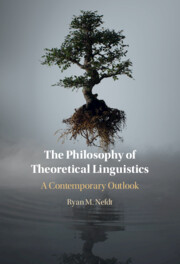Book contents
3 - Syntactic Metatheory
Published online by Cambridge University Press: 25 April 2024
Summary
Syntax is perhaps one of the most successful projects in the history of theoretical linguistics. It’s also garnered the most philosophical attention. Thus, this chapter focuses on syntactic metatheory. It surveys a number of prominent frameworks from minimalism to construction grammar, dependency grammar, lexical functional grammar and head-driven phrase structure grammar.The main aim is to find a common argument structure and strategy across diverse theoretical positions. In the tradition of recent work on scientific modelling in the philosophy of science, the approach that’s adopted in this chapter works from a bottom-up review of the cross-framework literature. I’ll make a case for a general explanatory strategy or scientific project at the core of linguistic syntax. The core idea is that this general scientific strategy is relatively stable across syntactic frameworks. In other words, the chapter aims to address the question of what minimalism, dependency grammar, radical construction grammar, head-driven phrase structure grammar, and lexical functional grammar have in common. The answer is a general formal strategy that focuses on rules in creating structural units, captures recursive phenomena, and, most importantly, treats syntactic information as explanatorily autonomous from other systems.
Keywords
Information
- Type
- Chapter
- Information
- The Philosophy of Theoretical LinguisticsA Contemporary Outlook, pp. 50 - 79Publisher: Cambridge University PressPrint publication year: 2024
